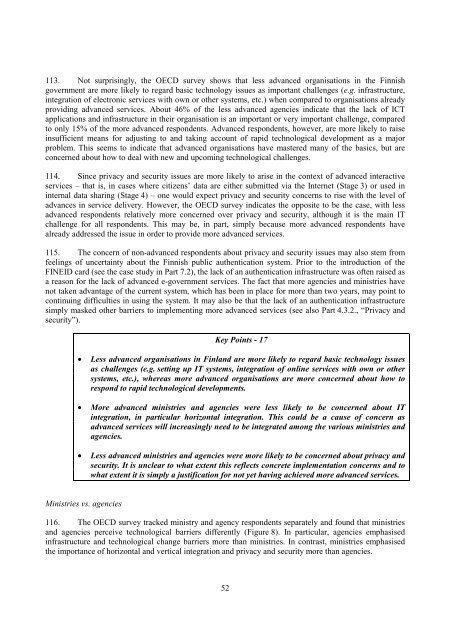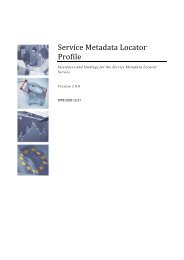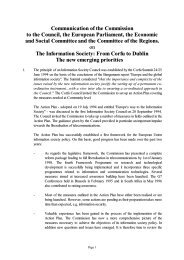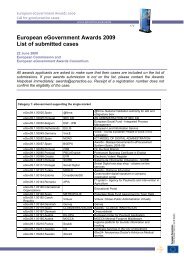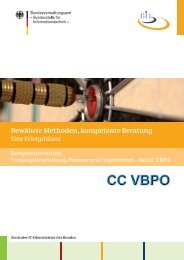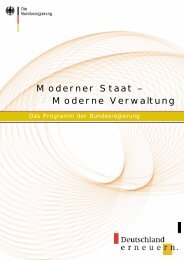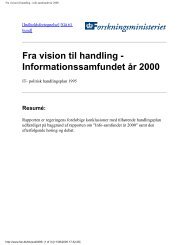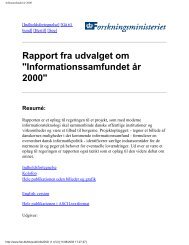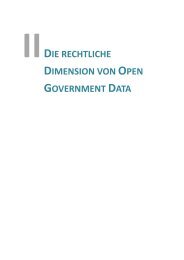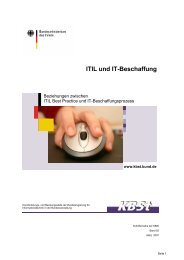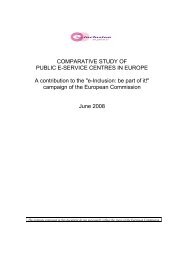e-GOVERNMENT IN FINLAND - ePractice.eu
e-GOVERNMENT IN FINLAND - ePractice.eu
e-GOVERNMENT IN FINLAND - ePractice.eu
You also want an ePaper? Increase the reach of your titles
YUMPU automatically turns print PDFs into web optimized ePapers that Google loves.
113. Not surprisingly, the OECD survey shows that less advanced organisations in the Finnish<br />
government are more likely to regard basic technology issues as important challenges (e.g. infrastructure,<br />
integration of electronic services with own or other systems, etc.) when compared to organisations already<br />
providing advanced services. About 46% of the less advanced agencies indicate that the lack of ICT<br />
applications and infrastructure in their organisation is an important or very important challenge, compared<br />
to only 15% of the more advanced respondents. Advanced respondents, however, are more likely to raise<br />
insufficient means for adjusting to and taking account of rapid technological development as a major<br />
problem. This seems to indicate that advanced organisations have mastered many of the basics, but are<br />
concerned about how to deal with new and upcoming technological challenges.<br />
114. Since privacy and security issues are more likely to arise in the context of advanced interactive<br />
services – that is, in cases where citizens’ data are either submitted via the Internet (Stage 3) or used in<br />
internal data sharing (Stage 4) – one would expect privacy and security concerns to rise with the level of<br />
advances in service delivery. However, the OECD survey indicates the opposite to be the case, with less<br />
advanced respondents relatively more concerned over privacy and security, although it is the main IT<br />
challenge for all respondents. This may be, in part, simply because more advanced respondents have<br />
already addressed the issue in order to provide more advanced services.<br />
115. The concern of non-advanced respondents about privacy and security issues may also stem from<br />
feelings of uncertainty about the Finnish public authentication system. Prior to the introduction of the<br />
F<strong>IN</strong>EID card (see the case study in Part 7.2), the lack of an authentication infrastructure was often raised as<br />
a reason for the lack of advanced e-government services. The fact that more agencies and ministries have<br />
not taken advantage of the current system, which has been in place for more than two years, may point to<br />
continuing difficulties in using the system. It may also be that the lack of an authentication infrastructure<br />
simply masked other barriers to implementing more advanced services (see also Part 4.3.2., “Privacy and<br />
security”).<br />
Key Points - 17<br />
x Less advanced organisations in Finland are more likely to regard basic technology issues<br />
as challenges (e.g. setting up IT systems, integration of online services with own or other<br />
systems, etc.), whereas more advanced organisations are more concerned about how to<br />
respond to rapid technological developments.<br />
x More advanced ministries and agencies were less likely to be concerned about IT<br />
integration, in particular horizontal integration. This could be a cause of concern as<br />
advanced services will increasingly need to be integrated among the various ministries and<br />
agencies.<br />
x Less advanced ministries and agencies were more likely to be concerned about privacy and<br />
security. It is unclear to what extent this reflects concrete implementation concerns and to<br />
what extent it is simply a justification for not yet having achieved more advanced services.<br />
Ministries vs. agencies<br />
116. The OECD survey tracked ministry and agency respondents separately and found that ministries<br />
and agencies perceive technological barriers differently (Figure 8). In particular, agencies emphasised<br />
infrastructure and technological change barriers more than ministries. In contrast, ministries emphasised<br />
the importance of horizontal and vertical integration and privacy and security more than agencies.<br />
52


